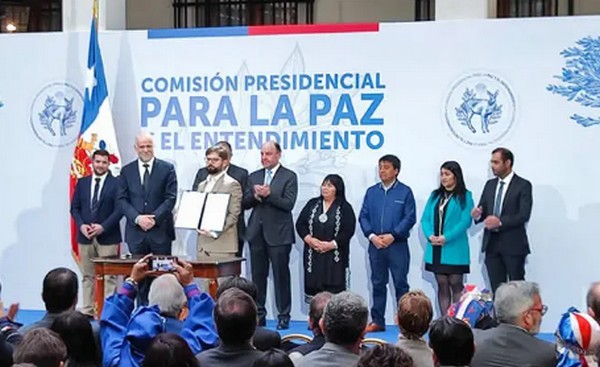Following recent publications in La Tercera detailing the proposals presented by members of the Commission for Peace and Understanding, the Multigremial of Araucanía stated that "we wish to express our utmost concern regarding an approach that perpetuates historical mistakes and threatens to deepen the crisis in our region."
As stakeholders committed to the development and peace of La Araucanía, we believe these proposals reinforce a policy model that favors excessive spending, incentivizes privileges, and worsens social divisions.
One of the most concerning proposals is the creation of a Land Bank as a response to territorial claims. This idea continues to focus on a problem poorly resolved by the State, unfairly placing responsibility on current landowners, who did not create the issue.
Over the past decades, the State has spent more than $1 billion on land purchases, most of which have been left abandoned or unproductive. Now, an additional $3 billion is proposed, perpetuating what we have called the "Bottomless Pit"—a system that destroys the region's productive capacity without addressing root problems.
Currently, this policy costs an average of 100 million pesos per beneficiary family, with transfers made without rigor, justified by missing land titles. These figures are not only unsustainable but also represent an injustice to the average Chilean. Moreover, the results are null: beneficiaries remain in the same initial situation while productive losses deepen.
We acknowledge the need for reparations for those who have genuinely suffered losses regarding titles recognized by the Chilean State, but this must be limited to those who can prove legitimate rights through land titles or other valid legal instruments. Reparations cannot become a system of privileges that harms the rest of the country. Justice must be built without destroying productivity or imposing disproportionate costs that all Chileans end up paying. In this regard, we reiterate that reparations should include options other than land transfers, allowing beneficiaries to choose freely and enabling sustainable and effective solutions for regional development.
Similarly, we call on some commissioners to avoid experiments and trials with our Araucanía. Instead of policies that only generate uncertainty and further divide the region, it is urgent to implement concrete measures that promote work and revitalize abandoned lands. Land cannot continue to be the core of the problem or a tool that deepens poverty in La Araucanía.
Therefore, we reaffirm our commitment to the freedom to undertake. In our region, all those who wish to create value, work, and invest are welcome, regardless of origin—because that is the foundation for achieving development and peace. However, we are concerned by the attitude of those who seek to decide who can or cannot work in the southern regions or who feel entitled to dispose of legitimately acquired resources. These exclusionary visions only hinder the progress of our region and its inhabitants.
On another note, we are concerned that some commissioners have proposed pardons for those convicted of serious crimes related to territorial disputes. This is a blow to justice and a setback in building peace. Does this idea include figures like Héctor Llaitul? Justice cannot be negotiable, and any attempt to validate violence as a pressure mechanism is a danger to the future of our region.
The country has the opportunity to correct its course and repair the immense damage caused, with the goal of rebuilding trust and projecting a future of peace and development. This includes, among other things, reforming the Indigenous Law, ensuring solutions that respect private property, drive development, and promote peaceful coexistence.
To repair is not to divide. To move forward is not to return to the past.







Comentarios (0)
No hay comentarios aún. ¡Sé el primero en comentar!
Deja un comentario